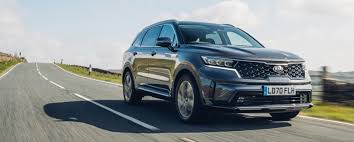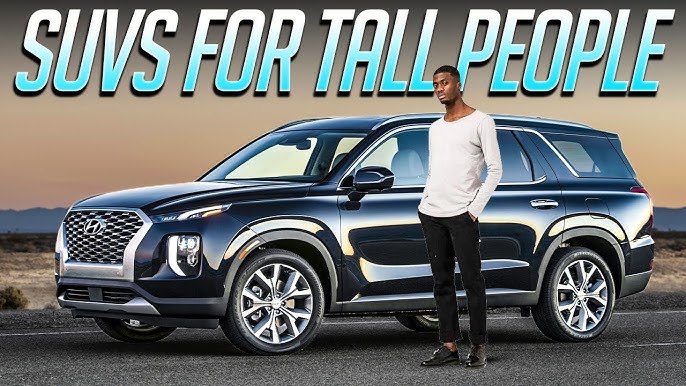An SUV, or Sport Utility Vehicle, is a type of vehicle known for its height, spacious interior, and versatility. In fact, the logic of the SUV vehicle is to combine its large volume, high off-road capacity with a car-style driving style. Such vehicles are ideal family cars, and they also stand out with their ability to pass through rough terrain. In addition, despite their high ground clearance, they can exhibit driving behaviors like a passenger car in terms of road holding.
What does SUV stand for?
SUV stands for Sports Utility Vehicle and has come into our lives from the USA. These vehicles combine off-road driving capabilities, including higher traction and flexible suspension, with comfort and style.
SUVs were originally designed as military vehicles. The US military asked manufacturers to develop a prototype vehicle that would be four-wheel drive and strong and durable enough to carry soldiers across difficult terrain. Willy’s Overland created the Jeep in preparation for World War II. England then adapted the vehicle with the Land Rover produced by Maurice and Spencer Wilks. This model had similar specifications to the American Jeep, but was used more by farmers and was released in 1948.
What are the features that distinguish SUV vehicles from others?
The reason SUV vehicles cause so much confusion is because they actually combine the features of many different types of vehicles. SUVs, which are literally a fusion type of vehicle, combine the features of many types, from station wagons to hatchbacks, 4x4s to off-road vehicles. SUVs are among the most preferred family cars. SUVs, which are frequently preferred by large families due to their large space volumes, are available in quite different sizes.
One of the most confusing issues when it comes to the SUV segment is that SUV and 4×4 are thought to mean the same thing. Despite their similarities, SUVs do not always have to have four-wheel drive. To be more precise, not all SUVs are 4x4s and not all 4x4s are SUVs. Depending on preference, some SUV models can be sold with front-wheel drive and some with rear-wheel drive. Models with 4-wheel drive distribute the power they receive from the engine to all four wheels. This power distribution can automatically adjust which wheel to be given according to road conditions. This provides higher traction in all road conditions.
What are the types of SUV vehicles?
With the increasing interest in SUV vehicles, the variety of SUV models has also increased. SUVs are classified based on their size, design features and technology, as well as their off-road capabilities.
- Crossover: Crossovers are built on the passenger car platform and are generally compact in size. Although capable of light off-road driving, they are primarily designed for on-road use. They are suitable for families and everyday use, with their high ground clearance, spacious interior, and compact dimensions that make them easy to use in urban areas. Crossovers prioritize fuel efficiency and driving comfort, and are often available with all-wheel drive (AWD), but are not ideal for serious off-road conditions.
- Compact SUV: Compact SUVs combine the features of a classic SUV with a smaller body, making them suitable for both urban and intercity journeys. They offer a spacious interior, a high driving position and good road holding. Their compact dimensions make it easy to park and manoeuvre in the city, while also offering a larger luggage space and passenger capacity. They are often available with four-wheel drive, but are not for serious off-road driving; they can also be used comfortably on light off-road conditions.
- SUV: SUV (Sport Utility Vehicle) are larger, more durable and higher-performance vehicles than crossovers and compact SUVs. Their spacious interior and high seating position offer drivers good visibility. SUVs are generally equipped with powerful engine options, four-wheel drive (AWD or 4WD) and advanced driving assistance systems. They provide both a comfortable ride in the city and are suitable for difficult road conditions and light off-road driving. They are ideal for large families, especially thanks to the comfort and high carrying capacity they offer on long journeys.
- 4×4 SUV: These vehicles are SUVs with a four-wheel drive (4WD) system developed to provide high off-road performance. They provide maximum traction in completely rugged terrain, difficult weather and road conditions, and are therefore preferred for off-road driving. Their powerful engines, durable chassis structure and improved suspension systems offer a safe ride even in harsh off-road conditions. They often have high ground clearance and special tire options; they are an ideal option for off-road enthusiasts and those looking for a durable vehicle suitable for difficult conditions.
Segment ranking in SUV vehicles
- B segment SUV vehicles are in the small class vehicle category. These vehicles are more suitable for city use and can also be used on long journeys. B segment is also called “mini SUV”.
- The interior volumes of SUV vehicles in the C segment are larger than those in the B segment. This segment is also called “compact SUV” and the vehicles in this class have the comfort of a passenger car.
- SUV vehicles in the D segment are defined as upper-middle class. Having a larger interior volume and higher engine capacity compared to vehicles in the C segment, the D segment also makes a difference in terms of performance. SUVs in this segment are also called “large family vehicles.”
- E segment SUV vehicles are in the upper class category. Representing power and comfort, E segment SUVs are also known as “full-size SUVs” in the world.
- F segment SUV vehicles are considered the “luxury” class. Drawing attention with their high equipment features, material quality and spacious interior volumes, F segment SUVs are also known as “extended-length SUVs” in the world.
Are SUVs safer than cars?
According to research conducted by the Insurance Institute for Highway Safety (IIHS), 20 SUVs were named as the “Top Safety Pick” in 2019. There are other reports that show that SUVs are significantly safer than hatchbacks or sedans. This is due to the size of the exterior casing of SUVs. At the same time, SUVs can take a much bigger impact due to their height and reinforcement. In fact, one study shows that the probability of an SUV driver or passenger escaping a car accident without serious injury is at least 50% higher than a sedan. While this is true, it is important to choose a vehicle with up-to-date safety equipment such as anti-lock brakes, curtain airbags, and stability control.
What are the advantages of SUV vehicles?
- SUV vehicles, which are suitable for off-road conditions, stand out with their performance in difficult off-road conditions thanks to their powerful engines with high torque values, 4×4 four-wheel drive systems, and durable and high-ground structures.
- The interior volume of SUV vehicles is generally larger than sedans or hatchbacks in the same segment. For this reason, they offer a more spacious and comfortable interior environment for the driver and passengers.
- Large 7-seater SUVs have more passenger capacity.
- The large luggage compartment dimensions and the additional loading capacity provided by folding the rear seats in different ways are satisfactory. The functional opportunities it provides are especially preferred by families with children.
- The high ground clearance of SUV vehicles provides a wide-angle driving experience and road handling.
- With their large dimensions and strong design lines, SUV vehicles have an impressive exterior appearance.
- All automobile brands have increased their model range due to the great interest in SUV vehicles. This offers many model options for different needs.
Can SUVs be used off-road?
Traditional models, such as the Toyota Land Cruiser, are based on ladder chassis. However, SUV crossovers, such as the Citroen C3 Aircross, are more suited to highway driving. When we look at best-selling SUVs such as the Ford Kuga, Hyundai Tucson and Volkswagen Tiguan, they are all capable of completing off-road journeys, albeit to varying degrees.
Do SUVs consume more fuel?
SUVs generally consume more fuel than other cars due to their traction power, weight and the power of the engines they use. However, it is observed that the fuel consumption of the more compact B-SUV and C-SUV vehicles, which are produced for urban use and normal asphalt road conditions, is close to C segment cars. Hybrid SUVs consume less fuel than similar gasoline or diesel engine SUVs. 100% electric SUVs have been preferred more in recent years due to the performance they offer without consuming fuel.
Which are the most preferred SUV vehicle models?
Fuel efficiency, safety, comfort, spacious interior and advanced driving features are among the most sought-after features in modern SUV preferences. These vehicles offer comfortable driving and high fuel efficiency in the city while maintaining their off-road capabilities. Especially suitable for large families and long journeys, SUVs provide drivers with a safe experience with high visibility and strong road holding. In addition to diesel models, the options have increased with the spread of environmentally friendly hybrid and electric SUVs in the market. Hybrid and electric SUVs, standing out with their silent driving and low emission advantages, have gained an important place in the preferences of modern users.
Why choose an SUV?
SUV-style vehicles have become the preferred choice because they inspire confidence in their users and passengers with their imposing appearance. In addition, the high seating position provides a more commanding ride on the road, allowing users to drive more comfortably. In addition, SUVs exceed expectations with their spacious interiors and stand out in terms of safety. SUVs, which also offer more in terms of off-road capabilities, continue to become increasingly popular with their attractive designs.
If it is going to be used mostly in the city, it may be more logical to choose a small or compact SUV. In this way, there is no parking problem in the city and the maneuverability of the drivers increases. There are also advantages in terms of usage cost. However, if your aim is to travel more and have an off-road experience, you can buy a D segment SUV. In this way, you can have a comfortable driving experience outside the city and on rough terrain.




Pingback: Kia Sorento: A Practical Small 3-Row SUVs for Families - Car Suv Best
Pingback: Honda CR-V: A Top Pick for Small 3-Row SUVs - Car Suv Best